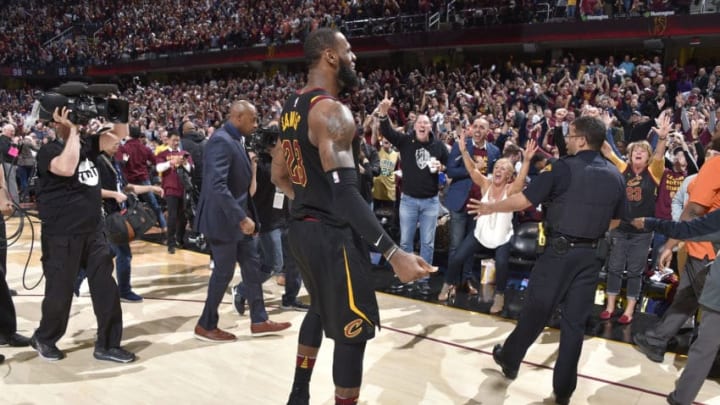
Running into an all-time great team
But then he ran into a team that no mortal man could beat, given the Cavaliers’ roster. And about a week later Kawhi Leonard leaked his desire to be traded to the press.
And here we go... sources tell @ExpressNews that Kawhi Leonard wants to be traded from #Spurs ... more to come...
— Jabari Young (@JabariJYoung) June 15, 2018
And just like that, it has all been forgotten. Nevertheless, I’m here to remind everybody of what we just witnessed. I refuse to let 2018 LeBron become the 2015 Spurs.
On February 7th, LeBron kicked off his run with an instant classic. Shooting 73% from the floor, he dropped a 37-point, 15 assist triple-double, including an incredible two-way sequence to win the game: A gravity-defying block of Jimmy Butler, and a fading buzzer-beater over Butler’s outstretched arm in overtime.
This started a 30-game stretch of regular season basketball that would put any MVP campaign to shame. LeBron averaged 29.5 points, 9.8 rebounds and 10.0 assists, shooting 54.1% from the field and 38.9% from three.
More from King James Gospel
- 3 possible starting lineups for Cleveland Cavaliers in 2023-24
- The Cavaliers may have snagged a hidden gem in Craig Porter Jr.
- 4 players the Cavaliers should pursue in 2024 free agency
- 6 players Cavaliers might replace Jarrett Allen with by the trade deadline
- This stat is one to keep an eye on for Cavaliers’ Max Strus in years ahead
As a point of reference, that is basically the stat line put forward by Russell Westbrook in his MVP season, but on a 12% higher effective field goal percentage, and with 1.5 fewer turnovers.
The Cavaliers went 20-10 over that stretch, finishing 50-32, which was just one game worse than the Cavaliers finished the previous season with the help of Kyrie Irving.
Then, impossibly, LeBron reached another level in the playoffs, averaging an astonishing 34.0 points, 9.1 rebounds and 9.0 assists.
But this is about more than just “counting stats” and percentages. LeBron did all of this while facing a degree of difficulty we haven’t seen before for a player of his caliber.
Almost every star player experiences an efficiency drop-off in the postseason.
Kevin Durant shot 4.5% (eFG) worse than he did in the regular season. Stephen Curry shot 6.2% (eFG) worse. James Harden shot 6.3% (eFG) worse. Even LeBron’s teammate, Kevin Love, experienced a precipitous drop-off, shooting 9.5% (eFG) worse than he did in the regular season.
This is normal. The postseason is not only a murderers row of elite teams, it’s also officiated differently. The advantage shifts back to the defender who is allowed a level of physicality rarely seen in November. It affects the efficiency of every player.
Just not LeBron James, who shot a 59% effective field goal percentage in the regular season, and 58% in the postseason. All while facing three of the top ten defenses in the league (by defensive rating in the regular season).
